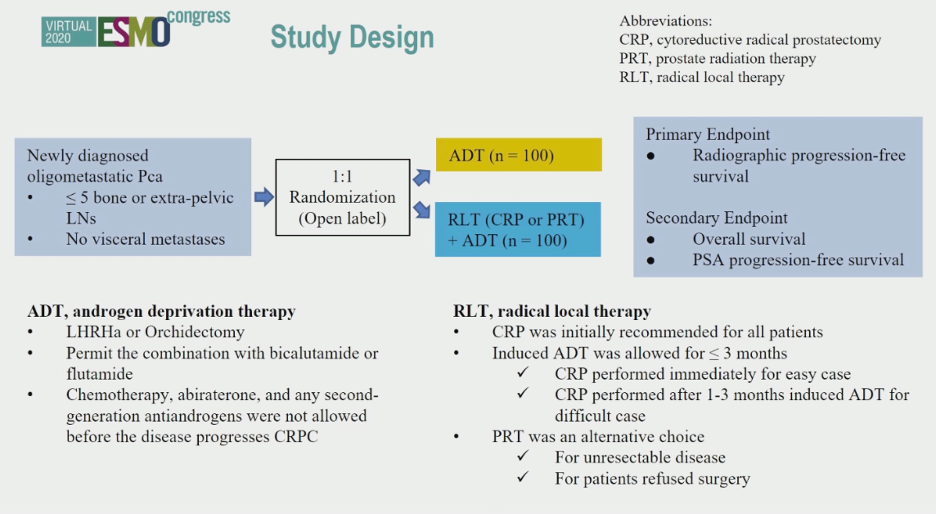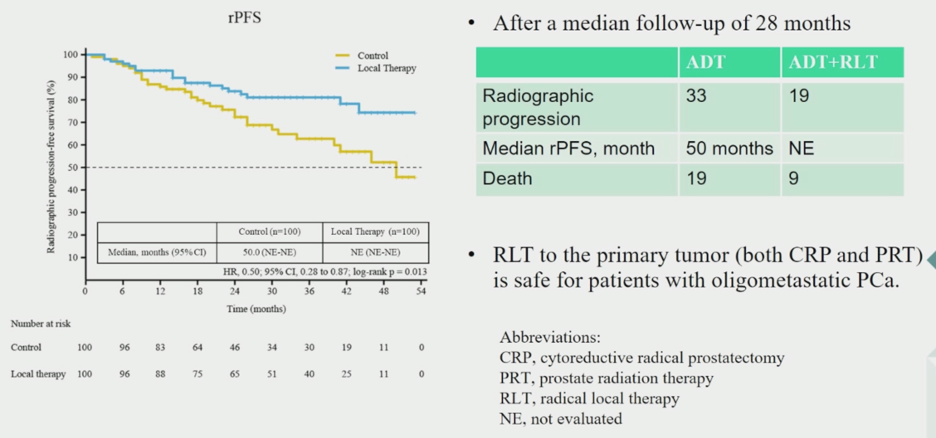(UroToday.com) The benefit of local therapy to the prostate in metastatic prostate cancer remains unclear. There was no survival benefit to local therapy across unselected patients with metastatic prostate cancer in the HORRAD and STAMPEDE trials, but unplanned subgroup analysis in the HORRAD trial suggested benefit in those with low-volume metastatic disease and planned subgroup analysis in STAMPEDE showed a survival benefit (hazard ratio for death 0.68, p = 0.007).
To prospectively evaluate the role of local therapy to the tumor in low-volume metastatic disease, Dr. Dai and colleagues designed a randomized controlled trial of androgen deprivation therapy versus androgen deprivation therapy and radiotherapy to the prostate. Men with treatment-naïve oligometastatic prostate cancer diagnosed within the past six months were eligible for the trial if they have no more than 5 bone or extra-pelvic lymph node metastatic sites. The study schema is shown below:
One key point is that androgen deprivation therapy was limited to testosterone suppression by orchiectomy or LHRH axis therapy, and bicalutamide or flutamide were allowed in combination, but abiraterone or other second-generation anti-androgens were excluded. The primary outcome was radiographic progression free survival, with overall survival and PSA PFS as secondary endpoints.
Patient demographics are shown below. The majority of patients received prostatectomy as their local therapy (85%), with 11% receiving radiotherapy.
At a median follow-up of 28 months, more patients receiving androgen deprivation and local therapy to the prostate were free from radiographic progression relative to patients receiving ADT alone. Longer follow-up is required before reporting overall survival data.
In summary, Dr. Dai and colleagues presented prospective randomized trial data comparing ADT (no abiraterone or second-generation anti-AR therapy) with ADT + local therapy to the prostate (most commonly by surgery) and showed improved radiographic progression free survival to date. Overall survival data will be reported when mature.
Presented by: Bo Dai, MD, PhD, Department of Urology, Fudan University Shanghai Cancer Center, Shanghai, China
Written by: Alok Tewari, MD, PhD, Medical Oncologist at the Dana-Farber Cancer Institute, at the European Society for Medical Oncology Virtual Congress, ESMO Virtual Congress 2020 #ESMO20, 18 Sept - 21 Sept 2020


